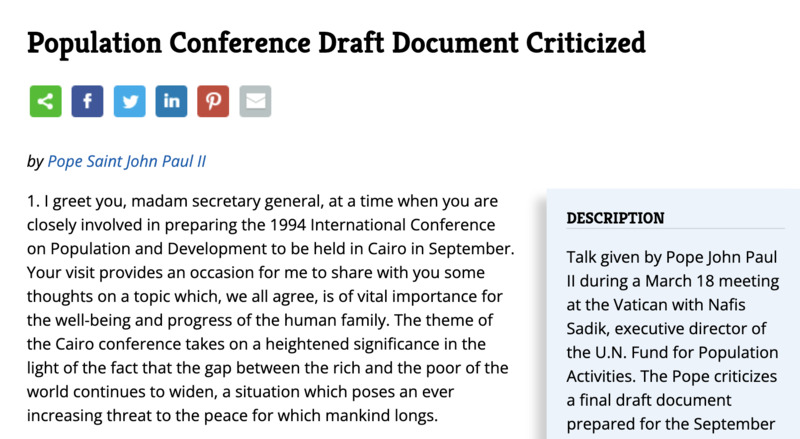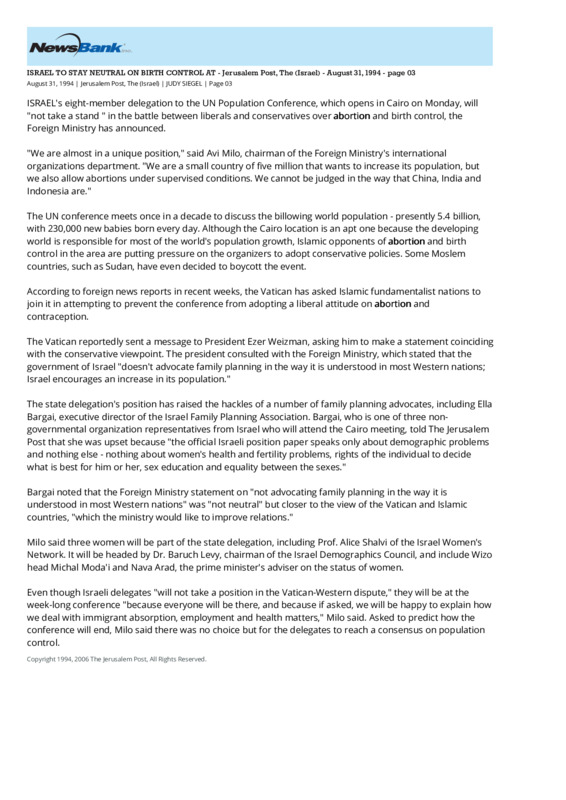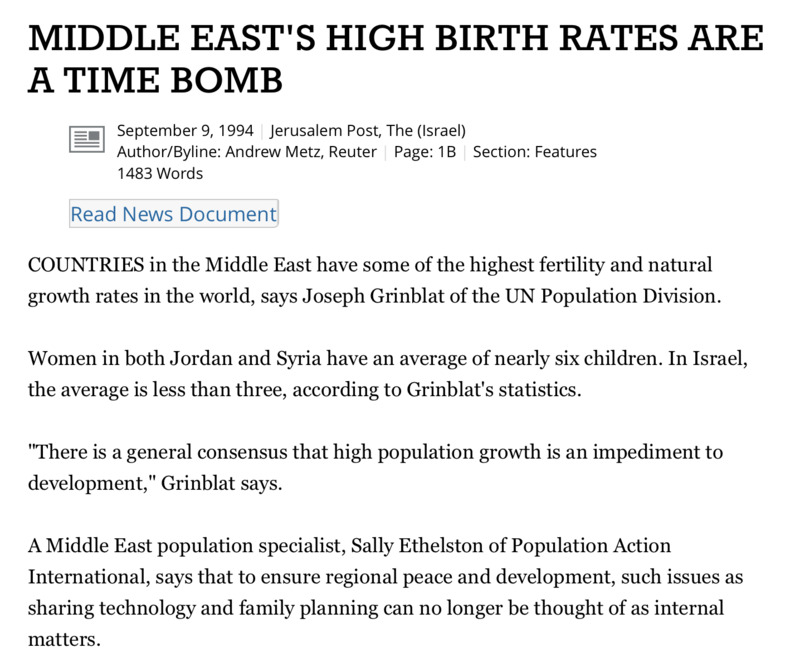International Reactions
Below is a series of news reports and scholarly journal entries regarding how the UN population conferences was responded to by the international community.
On March 18, Nafis Sadik, who is an executive director of the U.N. Fund for Population Activities, met with Pope Saint John Paul II at the Vatican. In this speech, the Pope shares some of his thoughts and criticizes a final document prepared for September U.N. International Conference on Population and Development in Cairo, Egypt. He acknowledges that the “global population situation” is very complex. Additionally, he recognizes the theme of the Cairo conference takes on a heightened significance “in the light of the fact that the gap between the rich and the poor of the world continues to widen,” which is a situation that poses a threat to mankind.
Importantly, Pope Saint John Paul II recognizes the fundamental role of the family in society. He draws special attention to the “status of children and women who all too often find themselves the most vulnerable members of our communities.” He understands that women should not be treated as a burden or inconvenience but “should be cherished as bearers of hope and signs of promise for the future.” Finally, the Pope recognizes how “None of the issues to be discussed is simply an economic or demographic concern, but at root each is a matter of profound moral significance with far-reaching implications.”
This article was written by Judy Siegel of The Jerusalem Post. Siegel is the health and science reporter at The Jerusalem Post. In fact, she has been writing for the paper since February 1973 and is still writing for the paper today. In this article, Siegel writes that Israel's eight-member delegation to the U.N. Population Conference will not take a stand in the "battle between liberals and conservatives over abortion and birth control," which was announced by the Foreign Ministry. Siegel includes a quote from Avi Milo, who was the chairman of the Foreign Ministry’s international organizations department. Milo recognized Israel’s hope to build and grow their population rather than reduce it. He states, “We are a small country of five million that wants to increase its population, but we also allow abortions under supervised conditions.”
Siegel notes that Israel’s delegation’s position raised some controversy in the eyes of family planning advocates, such as Ella Bargai, who was the executive director of the Israel Family Planning Association. In an interview with Bargai, she claimed, “the official Israeli position paper speaks only about demographic problems and nothing else - nothing about women's health and fertility problems, rights of the individual to decide what is best for him or her, sex education and equality between the sexes.” Finally, Siegel concludes with writing Milo’s beliefs on how the conference will end in Cairo. He thinks that there is no choice but for the delegates to reach a consensus on population control.
Although Israeli governmental positions and Jewish viewpoints must not be conflated, there were no Jewish organizations outside of the Israeli delegation present at the conference, and so Israeli statements are the best representations of a Jewish perspective on abortion at the conference we have. This statement on abortion differs from other religious voices, such as that of the Vatican and some Islamic countries, in the lead up to the conference, and is a reminder that the religious interaction with abortion, at this population conference and in general, is multifaceted.
The Jerusalem Post published an article written by Andrew Metz on a widely political stance fueled by religious motivations within Israel relating to the conference. Although Israel remains a stated secular state, it is founded and utilizes religious sentiment to justify far-right stances within the political realm. So, for example, news outlets like The Jerusalem Post began as a leftist news source (originally entitled The Palestine Post), but transitioned to a far-right outlet in the 1980s, including far-right religious ideals in dispersing controversial right-leaning politics.
Written during the middle of the conference on September 9, 1994, the article combats the pressing regional issue of overpopulation: "In Syria, the growth rate is 3.7 percent per year. Israeli growth rate is slightly more than 1 percent, and Gaza is about 5 percent - the highest in the world ... this growth ... is difficult to stabilize because of the influence of traditional Islamic values and the 'conflicts in the region.'" Further, sociologist Sabri Rbeihat says "population growth swallows achievement at an economic level." These quotes demonstrate the perceivement of religious ideology provoking regional issues of overpopulation, which remains in Israel's best interest to assert power over population control in the Palestinian territories, (as they justify it through religiously motivated rhetoric).
The later part of the article discusses the role Islam plays in producing irrational beliefs on methods of contraception. The article writes that is a large belief among Arab men come to birth-control clinics, convinced by "popular and street conceptions - that inserting an IUD will hurt the husband's sexual organ, and even go up and pierce his heart." However, such thinking is usually among men who remain ignorant, much less those who are taking initiative to visit a birth-control clinic. Thus, this article significantly reminds its readers that abortion politics for political gain are often fueled by religious perception and motivations, which often are not entirely accurate.


